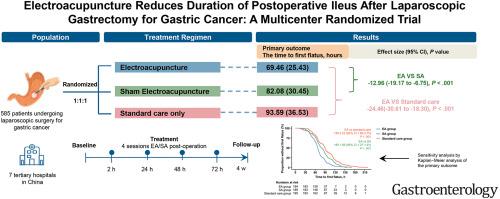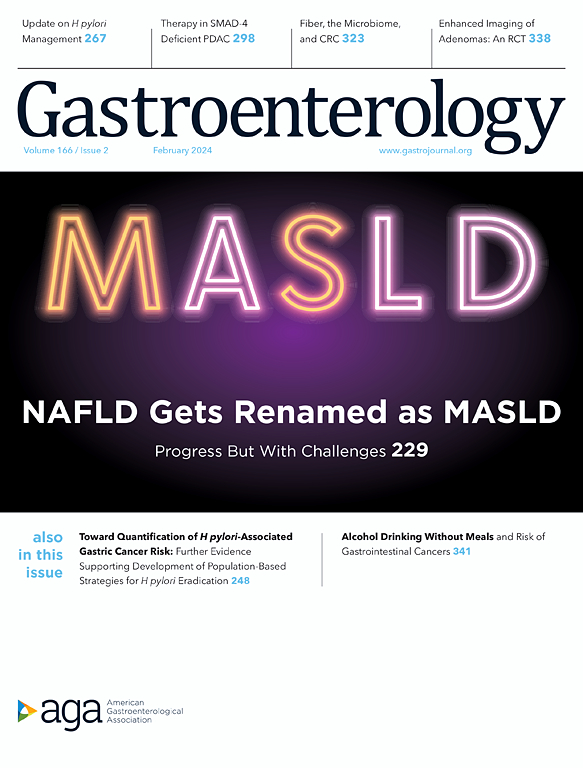Electroacupuncture Reduces Duration of Postoperative Ileus After Laparoscopic Gastrectomy for Gastric Cancer: A Multicenter Randomized Trial
IF 25.7
1区 医学
Q1 GASTROENTEROLOGY & HEPATOLOGY
引用次数: 0
Abstract
Background & Aims
Electroacupuncture (EA) may reduce the duration of postoperative ileus (POI) after laparoscopic gastrectomy for gastric cancer, although evidence is limited. We investigated the efficacy of EA in reducing POI duration and enhancing gastrointestinal (GI) recovery in patients undergoing laparoscopic surgery for gastric cancer.
Methods
This multicenter randomized trial was conducted at 7 hospitals in China, enrolling 585 participants who underwent laparoscopic resection for gastric cancer from October 27, 2021, to December 21, 2023. Participants received perioperative standard care and were randomized to 4 sessions of EA, 4 sessions of sham EA (SA), or standard care only. The primary outcome was the time to first flatus. Secondary outcomes included time to first defecation, dietary recovery, quality of life, postoperative mobilization, and duration of hospital stay.
Results
A total of 578 participants were in the full analysis set. EA exhibited a shorter time to first flatus compared with both SA and standard care, with differences of −12.96 hours (95% confidence interval (CI), −19.17 to −6.75; P < .001) and −24.46 hours (95% CI, −30.61 to −18.30; P < .001), respectively. Similarly, EA significantly reduced the time to first defecation: −15.41 hours (95% CI, −27.73 to −3.09; P = .007) vs SA; −24.66 hours (95% CI, −36.76 to −12.55; P < .001) vs standard care. Incidence of prolonged POI was significantly lower in the EA group than in the SA and standard care groups, with group differences of −0.41 (95% CI, −0.66 to −0.16; P < .001) and −0.56 (95% CI, −0.82 to −0.31; P < .001), respectively. No severe adverse events were reported.
Conclusions
EA was superior to SA and standard care only for reducing POI duration and the risk of prolonged POI in patients undergoing laparoscopic gastrectomy for gastric cancer (Chinese Clinical Trials Register identifier: ChiCTR2100050660).


电针减少胃癌腹腔镜胃切除术后肠梗阻持续时间:一项多中心随机试验
背景,尽管证据有限,但电针(EA)可能会缩短胃癌腹腔镜胃切除术后肠梗阻(POI)的持续时间。我们研究了EA在减少腹腔镜胃癌手术患者POI持续时间和促进胃肠道(GI)恢复方面的疗效。该多中心随机试验于2021年10月27日至2023年12月21日在中国7家医院进行,纳入585名接受腹腔镜胃癌切除术的患者。参与者接受围手术期标准护理,并随机分为四组EA,四组假EA (SA)或仅标准护理。主要观察指标是首次放屁的时间。次要结局包括第一次排便时间、饮食恢复、生活质量、术后活动和住院时间。结果578名受试者进入完整分析集。与SA和标准护理相比,EA出现首次放屁的时间更短,差异为-12.96小时(95% CI, -19.17至-6.75;P <.001)和-24.46小时(95% CI, -30.61至-18.30;P & lt;措施),分别。同样,EA显著缩短首次排便时间:-15.41小时(95% CI, -27.73至-3.09;P = .007) vs . SA;-24.66小时(95% CI, -36.76 ~ -12.55;P & lt;.001)与标准治疗相比。EA组延长POI的发生率显著低于SA组和标准治疗组,组间差异为-0.41 (95% CI, -0.66 ~ -0.16;P & lt;.001)和-0.56 (95% CI, -0.82至-0.31;P & lt;措施),分别。无严重不良事件报告。结论sea仅在减少胃癌腹腔镜胃切除术患者POI持续时间和延长POI风险方面优于SA和标准护理(试验号:ChiCTR2100050660)。
本文章由计算机程序翻译,如有差异,请以英文原文为准。
求助全文
约1分钟内获得全文
求助全文
来源期刊

Gastroenterology
医学-胃肠肝病学
CiteScore
45.60
自引率
2.40%
发文量
4366
审稿时长
26 days
期刊介绍:
Gastroenterology is the most prominent journal in the field of gastrointestinal disease. It is the flagship journal of the American Gastroenterological Association and delivers authoritative coverage of clinical, translational, and basic studies of all aspects of the digestive system, including the liver and pancreas, as well as nutrition.
Some regular features of Gastroenterology include original research studies by leading authorities, comprehensive reviews and perspectives on important topics in adult and pediatric gastroenterology and hepatology. The journal also includes features such as editorials, correspondence, and commentaries, as well as special sections like "Mentoring, Education and Training Corner," "Diversity, Equity and Inclusion in GI," "Gastro Digest," "Gastro Curbside Consult," and "Gastro Grand Rounds."
Gastroenterology also provides digital media materials such as videos and "GI Rapid Reel" animations. It is abstracted and indexed in various databases including Scopus, Biological Abstracts, Current Contents, Embase, Nutrition Abstracts, Chemical Abstracts, Current Awareness in Biological Sciences, PubMed/Medline, and the Science Citation Index.
 求助内容:
求助内容: 应助结果提醒方式:
应助结果提醒方式:


